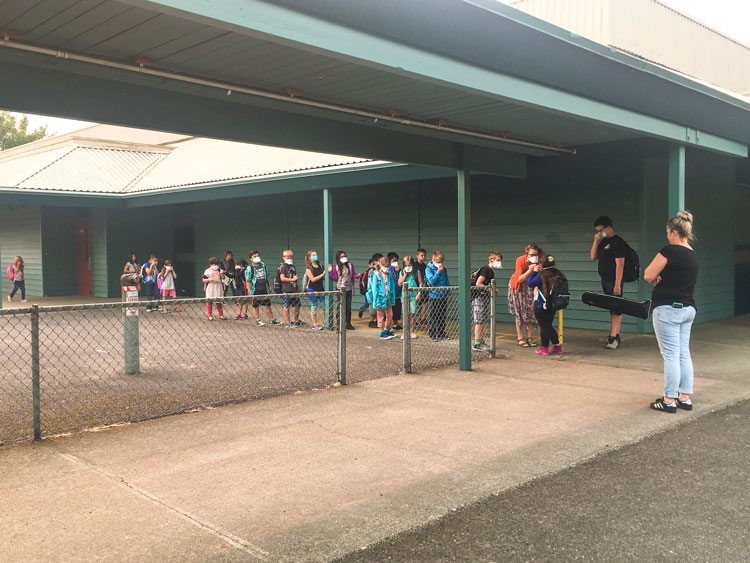VANCOUVER — Wildfires are creating unhealthy air quality for much of the region, according to Clark County officials who urged residents to take steps to limit their exposure to outdoor air and be alert to local fire danger from excessively dry conditions, wind and heat.
All people in a smoky area, except emergency personnel, should avoid strenuous work, exercise outdoors or driving whenever possible. If driving is necessary, run the air conditioner on the “recycle” or re-circulate mode to avoid drawing smoky air into the vehicle.
Closing up a home by shutting windows and doors can give some protection from smoke and ash. Most home air conditioners are designed by default to re-circulate indoor air. Systems that have both outdoor air and re-circulate settings need to be set on re-circulate to prevent smoke-laden air from being drawn into the home. People should drink plenty of fluids to keep their respiratory membranes moist. Vacuuming, except with HEPA filter-equipped vacuums, should be avoided, since most vacuums disperse fine dust into the air.

Smoky air can cause eye, nose and throat irritation and a range of respiratory problems. It can also aggravate existing lung, heart and circulatory conditions such as asthma and angina. People with asthma or other lung diseases should follow their medical management plans and stay indoors. They should consider leaving the area or spending time in an air-conditioned location if their homes lack air conditioning and it is too hot to keep windows and doors closed.
“To prevent smoke-related problems, we encourage people to avoid or limit physical activity outdoors and take shelter in air-conditioned buildings,” said Dr. Alan Melnick, Clark County health officer. “People with preexisting medical conditions, elderly people and the young are especially vulnerable to smoky air.”
People who work outside should remain indoors as long as the smoky air persists, if possible. Those who must work outdoors should consider wearing N95 masks and drinking plenty of water, particularly if wearing a mask. They should take periodic breaks indoors and stay indoors if they experience any respiratory stress.
Respirators should only be used after first using other, more effective methods to reduce exposure, such as including staying indoors, reducing activity, and using HEPA air cleaners.
Respirator masks labeled N95 or N100 filter out fine particles but not hazardous gases if a close-fitting model is selected and used properly. One-strap paper masks, surgical masks or other face coverings are likely to provide far less or no protection. N-95 masks can be found at many hardware and home repair stores and pharmacies. Respirator masks will not work on people with beards or small children because they do not seal well. Wearing a mask makes it more difficult to breathe, so anyone with lung disease, heart disease, or other chronic illness should consult a health care provider before using a mask.
Contact your health care provider if you experience heart or lung problems when around smoke. Dial 9-1-1 for emergency assistance if symptoms are serious.
Places in Clark County to escape smoke and heat include public libraries, shopping malls, cinemas and other air-conditioned locations listed below:
- Fort Vancouver Regional Library
To locate library branches and their hours of operation, visit http://www.fvrl.org/hours-locations.
- Firstenburg Tower at PeaceHealth Southwest Medical Center
400 N.E. Mother Joseph Place
(360) 514-2000
Hours: Tue., Sept. 5, 11 a.m.-7 p.m.
- Water Resources Education Center
4600 S.E. Columbia Way
(360) 487.7111
Hours: Mon.-Fri. 9 a.m.-5 p.m., Sat. noon-5 p.m.
- Marshall Community Center
1009 E. McLoughlin Blvd.
(360) 487-7100
Hours: Mon.-Thu. 5:30 a.m.-9 p.m., Friday 5:30 a.m.-8 p.m., Saturday 7 a.m.-7 p.m.
- Firstenburg Community Center
700 N.E. 136th Ave.
(360) 487-7001
Hours: Mon.-Thu. 5:30 a.m.-9 p.m., Friday 5:30 a.m.-8 p.m., Saturday 8 a.m.-7 p.m., Sunday noon-6 p.m.
- Washougal City Hall
1701 C St.
(360) 835-8501
Hours: Mon.-Fri. 8 a.m.-5 p.m.
- Washougal Community Center
1681 C St.
Hours: Mon.-Thu. 9 a.m.-3 p.m., Friday 4 p.m.-6 p.m., Saturday 1 p.m.-6 p.m.
More information on cooling centers is available at http://cresa911.org/2017/07/31/cooling-center-locations/ and http://211info.org/emergency.
To receive timely emergency alerts on topics such as evacuations, severe weather, missing persons, fire, police action, hazardous spills or road closures, sign up for Clark Regional Emergency Services Agency’s reverse notifications at Clark.publicalaerts.org.
For information on current air quality conditions visit SWCleanair.org or Washington Air Quality Advisory Map and Airwatch Northwest.
Check wildfire locations at http://wasmoke.blogspot.com/.
More information about protecting yourself from smoky air: http://www.doh.wa.gov/CommunityandEnvironment/AirQuality/SmokeFromFires/WildfireSmoke.
Information provided by Clark County Communications.




